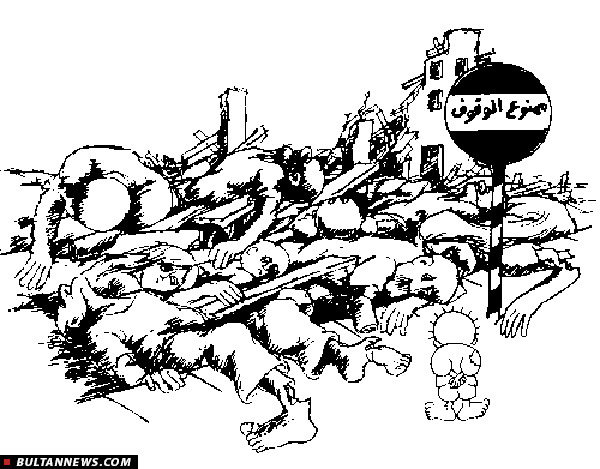کاریکارتوریست فلسطینی ناجی علی دریک نگاه NAJI AL-ALI دکتر رحمت سخنی از مرکز آموزشی درمانی امام خمینی (ره) ارومیه dr.rahmat.sokhani@gmail.com Starting from the right side of the caricature, Two days before his assassination, Naji Al-Ali was interviewed by Al-Azminah Al-Arabiya (Arab Times) Magazine, which represented the opposition in the United Arab Emirates, produced by Mr. Ghanim Ghabbash (also killed later on). The interview was published in the 170th issue on August 15, 1987. In that article, it was mentioned that Chairman of the PLO, Yasser Arafat, had once stood before Abdallah Al-Salim highschool in Kuwait, 1975, to present a speech to the students. In that Speech, Arafat said: "Who is this Naji Al-Ali? Tell him if he doesn"t stop drawing cartoons I will put his fingers in acid!" Ghanem Ghabbash, who himself interviewed Naji, reported Naji"s words: "Do you know this Rashida Mahran? Don"t mistaken her for one of the freedom fighters. Rashida Mahran is a very important lady who rides Arafat"s private jet and lives in a castle in Tunisia, where she has great influence on the organization (i.e. PLO) and its institutions. I made a cartoon about her, and after that I have received dozens of threats, blessings, and sympathy. Can you imagine that someone contacted me on behalf of Abu Iyad [one of the major leftist figures of PLO, who was killed later on by Israelis], and told me how delighted he was with the cartoon, and said that I have done something [great] that no other top official in the organization could do. But he also said that I have crossed the red lines and that he was worried about me and asked me to take care of myself. So I told him: My brother, if I"d take care of myself, I wouldn"t have enough time to take care of the rest of you." Naji was born in Palestine. In 1948, his family had fled their homeland along with Naji, leaving behind their house, furniture, orchards, and belongings. They fled to Lebanon, where they all became refugees. Since his childhood, Naji had a natural instinct for drawing. He drew on the wall, he drew on paper, he was drawing and painting wherever he was. Later in his life, Naji educated himself, and developed a political edge into his drawings. Naji"s icon, Al-Hanthalah, which you see in every cartoon he published (The short man with a bald head, torn clothes, and his hands behind his back), has a very deep meaning. Naji no longer needed to write his name on his work. He simply added Al-Hanthalah, which is an Arabic term for a desert plant with a sour taste. To Naji, the taste of pain. As you can see, the icon, which represents Naji himself, has his back always to the viewer. A representation of the Palestinian ... One who can only watch the misery, and can do nothing about it. An overwhelming hopelessness. 
On July of 1987, the London Observer published a caricature with the title: "The Deadly Joke That Cost
a Cartoonist His Life".
Arab peasant (A) says: "Do you know Rashida Mahran?"
Bourgeoisie Arab (B) replies: "No."
A says: "Have you ever heard of her?"
B replies: "No."
A says: "You never met her and never heard of her! Then how did you become a member of the Public Institute of Palestinian writers and journalists? ... Who is backing you in this Organization [PLO] you son of a bitch?"
![]()
| کد قالب جدید قالب های پیچک |




